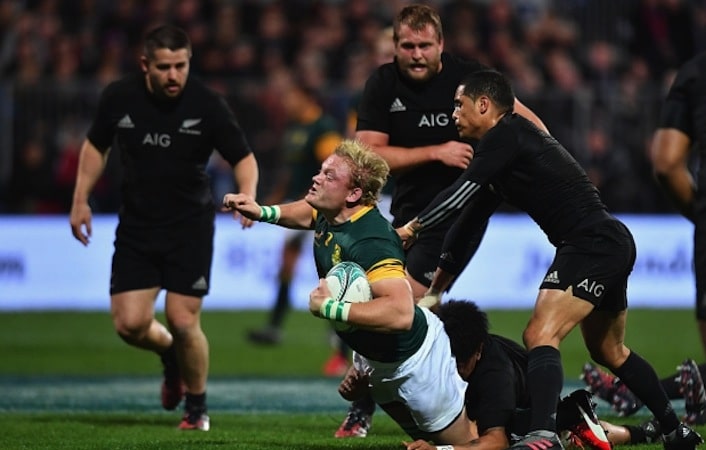The Springboks’ steep decline has not gone unnoticed in the northern hemisphere, with one prominent English writer declaring that South Africa could become the ‘West Indies of world rugby’ in the coming years.
The Boks have lost five of their nine Tests in 2016. That rotten run has included inaugural losses to Ireland at home and to the Pumas in Argentina. After losing 41-13 to the All Blacks in Christchurch, the Boks suffered their worst-ever home defeat when they went down 57-15 to New Zealand in Durban.
The Boks aren’t getting any better. The point has been made by many South African and New Zealand commentators, and most recently by Bok No 8 Duane Vermeulen, who played no part in the recent Rugby Championship campaign.
The Boks will travel to Europe this November to play Tests against England, Italy, and Wales. Many people in the northern hemisphere are expecting the Boks to lose that first match to England, a result that would mark South Africa’s first loss to England in 10 years.
‘South Africa’s record defeat by the All Blacks on Saturday was not a blip,’ wrote Owen Slot in the Times of London. ‘Neither was it a case of a good team at the bottom of a cycle who will soon come strong again. It was the starkest sign that one of the sport’s global superpowers are capitulating. South Africa are in danger of becoming the West Indies of world rugby.’
Slot went on to explain how the large number of South Africans competing in the United Kingdom, Europe, and Japan has contributed to the Boks’ decline.
‘The steady trickle of players going abroad at the end of their careers is now a tidal wave, and they don’t just go at the end any more, either. They go in their early twenties. The suggestion yesterday was that Eben Etzebeth, the South Africa lock, is soon to join Saracens. He is still only 24. This is the kind of player around whom the Springboks should be building their future, not waving goodbye to. In total, an estimated 350 of them are earning a living from the game outside of the country at present.
‘How many reasons do you want for the collapse of the Springbok giant? The strength of the rand is your starting point. A decent Super Rugby player, just below international level, will earn about R2 million (about £115,000) from his province, but in France, Japan or England, could almost double his money. A top international with a Springbok contract — Willie le Roux, for instance — will be making the equivalent of about £350,000 at home, but could come to Wasps and get a rise of some £150,000.
‘With the expanded Super Rugby competition, South Africans are now required to play in Argentina and Japan as well as Australia and New Zealand. It is no secret that the players struggle with the travel, the ever-changing time zones and, above all, the time away from families. Do it for a few seasons, then you want to get off.
‘This is all before you even get to the quota system: Coetzee must have half his squad for the 2019 World Cup made up of non-white players. Agree with it or not, it means more than just the fact that Coetzee will not be selecting on merit. It has a knock-on effect because it further persuades the young up-and-coming white players to seek their fortune abroad.’
Slot wondered if the upcoming coaching indaba in Cape Town would lead to any significant and much needed long-term changes.
‘They could start with the South Africa defence, or the change of playing philosophy and game plan midseason, or the lack of game intelligence. Yet that is all fingers in dykes.
‘Better tactics and selection is just a method of better masking reality. South African rugby will keep on spinning downwards unless it finds a way of better serving its one core remaining strength: the number of good players still being pumped out of schools like a factory production line. Cherish them and you still have a future.
‘The administration of SA Rugby had one option, three years ago: it had the chance to take a massive leap of faith, abandon Sanzar and the southern hemisphere Super Rugby competition, and form a north-south competition with Europe. This could have pumped more money into the game and created a more workable competition (similar time zones) for the players. Conservative thinking put paid to that.
‘[SA Rugby should] Put all the funds into just the six Super Rugby sides, and suddenly, for the factory line of players, moving abroad does not look such an obvious way to make a living. Yet when there are 14 votes for 14 provinces, who is going to vote themselves out of existence?
‘Unless something happens, though, South Africa is stuck in the spiral. It is not just South Africa that want a better Springbok team. The entire game is weaker with a wounded Springbok. Just as cricket is all the poorer for the long lost superpower of West Indies.’
Photo: Kai Schwoerer/Getty Images





